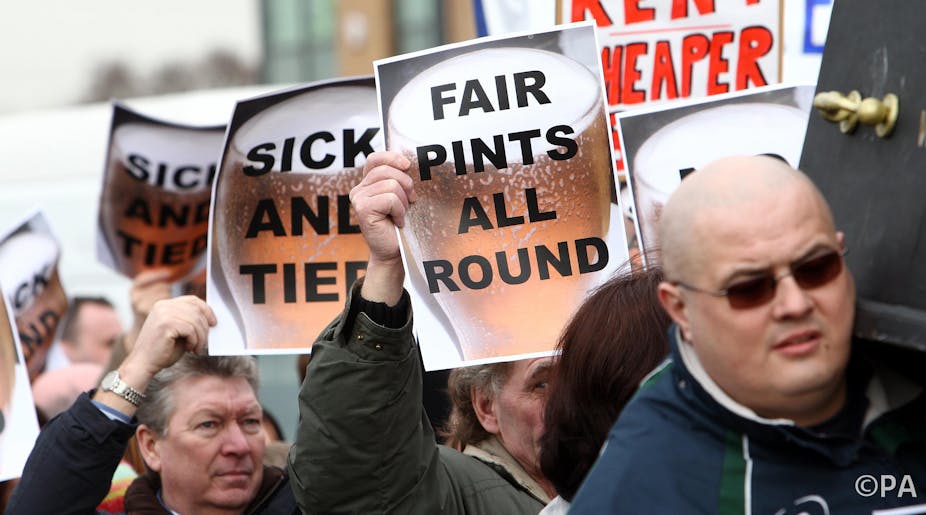Many publicans who run pubs owned by large companies earn less than the minimum wage. After years of complaints, finally the government has done something to address this situation. But the regulations may not have the intended effect.
The new measures, announced in the Queen’s speech, target companies that own a large number of pubs. These so-called “pubcos” were themselves a by-product of a political decision. In 1989, the Monopolies and Mergers Commission decided a few major brewers had too much power over the UK’s pub industry. Parliament then issued the so-called “Beer Orders” which forced large breweries (controlling about 80% of pubs at that time) to either sell their brewery business or their pubs.
Left without much choice, breweries were then forced to sell their pubs at very attractive prices, leading to the rise of large pubcos dedicated to selling beer rather than making it. Naturally, the main objective of pubcos was to maximise profit for their shareholders by renting their estates and selling beer at the highest possible prices.
This business model quickly became the dominant standard, with pubcos owning about 55% of all pubs by 2011. These pubs are “tied”, which means they can only buy beer from the pubco, generally at inflated prices, rather than buying it on the open market. In contrast, free houses are able to choose the beers they stock and where they buy it.
In the same year, the think-tank IPPR reported 46% of tied publicans earned less than £15,000 per year, in contrast to only 22% of non-tied publicans. Among tied publicans, 88% identified the beer tie as one of the most significant factors in their financial problems.
The pubcos themselves aren’t doing too well either. Some of the largest chains have lost a lot of money in recent years, leading to significant disinvestment, ownership changes and several pub closures.
As a result, of about 46,000 pubs in the UK today two fifths are now owned by pubcos, two fifths free-houses and the rest by breweries. But despite this rebalance in the market away from breweries towards private landlords and the introduction of self-regulative bodies to monitor the industry, many tenants still struggle financially. Some only manage a “profit” well below the minimum wage.
Help at hand?
Over the past four years the government has recognised the problem, conducting several consultations with pubs and the brewing industry. The main dispute highlighted in this work was over the introduction of a mandatory “free-of-tie” option. This would give tenants and lessees the freedom to purchase their beers from other suppliers rather than their renting companies. The tie is one of the reasons why almost all the beer in your local tends to be from the same brewery – for example Timothy Taylor’s pubs primarily stock Timothy Taylor’s beer.
Freeing the ties between publicans and their owners has been advocated by several tenant associations and the ale-drinker’s consumer organisation CAMRA, which argues that the tie is an unfair instrument used by pubcos to squeeze profits out of their publicans. Ironically, a policy instituted by the Monopolies Commission had led to a situation where those running pubs were subjected to their own personal monopoly on potential suppliers.
However, fierce opposition emerged from major pubcos and industry organisations such as the British Beer and Pubs Association (BBPA), which predicted high financial losses and pub closures due to reduced revenues. For pubcos, the BBPA argued, the tie represented a significant means for companies to generate profits to be reinvested into their estates.
The government proposes to introduce a core statutory code for all tied tenants in the sector, and an “enhanced code”, covering tenants tied to the largest pubcos. The enhanced code gives existing tenants the right to request an assessment from an independent adjudicator appointed to assess whether the contract negotiated with the pubco is better tied or free-of-tie. According to the government’s response, tenants will be able to discuss more suitable terms due to third party involvement.
These moves do hand more power to publicans in their struggle with big pubcos, but they represent a rejection of the mandatory free-of-tie option. The government has justified its decision by pointing to potential turbulence in the industry if large pubcos were hit hard by the loss of tied tenants.
The code also fails to include a “guest-beer option”, which would have given tenants freedom to purchase at least one beer of their choice from other suppliers. The pubcos argued this would have tempted many tied pubs to buy their best-selling beer outside their tenancy contract, depriving pubcos of valuable income.
Compared to 1989, this is a very cautionary step; the proposal still leaves some significant bargaining power in the hands of the largest pubcos. It is easy to see why the tied model wasn’t scrapped altogether though – it would have hit the largest pubcos hard, increasing the risk of closures and possibly doing more harm than good. That said, the number of pubs today is already a few thousands above the market’s sustainable limit.
But there is a more important aspect the government continues to overlook – delivering concrete measures in support of community pubs. These businesses are praised for their positive impact on rural and urban areas due to the social outlets and economic opportunities they provide. Whether closures hit tied pubs or free-houses, their losses have a devastating impact on the communities they serve.
Under current legislation and planning regulations it is still too easy to turn pubs into something else, either different businesses or private dwellings. Aside from regulating the market, the government should work to preserve the disappearance of pubs that represent assets for many British communities. Saving pubs where it really matters should be the main goal.

